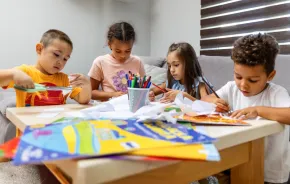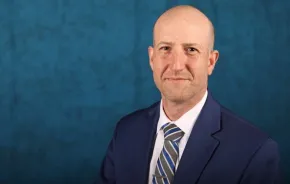Debra Ren-Etta Sullivan, Ed.D., was nearly 20 years into a successful
career in higher education when she discovered a whole new passion --
early childhood education.
It happened when she became the first dean of Pacific Oaks College
Northwest, which specialized in early childhood education. She began to
sit in on classes.
"I didn't want to be a teacher. I wanted to be boss of the world," she
says. She got that chance by creating her own world -- a school whose
hallmark was preparing teachers of young children in a diverse and
challenging world.
Sullivan recently became the founder and first president of the Praxis
Institute for Early Childhood Education. She has a doctorate in
educational leadership and a master's degree in curriculum and
instruction, both from Seattle University. Her bachelor's degree is in
cultural anthropology from the University of Washington. Sullivan
serves on the National Association for the Education of Young Children
Professional Development Review Panel, the Washington Learns Early
Learning Council, the Foundation for Early Learning Advisory Council
and the ParentMap Editorial Advisory Board.
Her most recent book is Learning to Lead: Effective Leadership Skills
for Teachers of Young Children. She lives in Seattle with her three
children, Porter, 17; Aaron, 14 and Siobhan, 11. Recently, ParentMap
spoke with Sullivan about leadership and early childhood education.
Q. Why did you write Learning to Lead?
A.
I wanted to help people recognize leadership skills in themselves and
the people around them. People see leadership only in famous people
making important things happen. When I was completing my doctorate, I
looked at the literature on leadership and it was like Donald Trump
writing a book for Lee Iacocca. Most people don't realize the effect
they have on other people. It's like that great wind blowing out there;
it's moving everything whether we see it or not.
We discount
our impact on other people's lives. If you see a gum wrapper on the
street and there's a child across the street, you are a leader to that
child. That child is watching whether you pick up the gum wrapper, put
it in your pocket or kick it across the street.
Q. What is your leadership style?
A.
I have an eclectic situational style. It is ever changing to meet
life's challenges. I was married for 20 years and my husband died last
January from a rare form of multiple sclerosis. Now I am having to
develop into a whole new person for myself and for my children. My
leadership has to change as my life changes.
Q. What are the qualities of an effective leader?
A.
When I think of leadership, it's about generating new leadership; it's
giving people everything you've got so they can do better than you did.
I've had teachers who would always hold something back. It wasn't
purposeful; it was just that they didn't see our roles changing. I
would always be the student; they would always be the teacher. If my
leader only gives me 95 percent of her knowledge, I can only pass on 95
percent; so I can't use what I don't have.
Q. How do you develop leadership skills in young children?
A.
Look at what drives them. If something drives you with passion, you're
going to show up in that area. If you notice that one little girl is
always the peacemaker, tell her she is good at that and that there are
people who do that for a living and they are called arbitrators. Look
at what a child likes to spend time on. Maybe you have a boy who spends
all his time playing video games. Talk to him about his skills at
problem solving and strategy.
Also notice what they struggle
with. Noting things they have to work on is part of developing
leadership. When my son was small, I noticed he had a problem playing
other people's games. His sister would invite him to a tea party and he
would turn it into a ball game. She would be crying that he ruined her
tea party. I told him that, in life, you have to learn to live by other
people's rules, too, not just your own.
Q. Is there too much pressure on young children to be successful today? What can parents do about that?
A.
We seem to be trying to professionalize childhood. Children feel that
their purpose in life is to perform for others; that approval matters
more than reality. When they volunteer in the community, they should do
something that is meaningful to them, not just try to fill their
community service hours. We should encourage them to make good grades
to learn and improve their lives so that they can improve the lives of
others, not just to try to get into Harvard. There are thousands of
colleges. We don't have to send all our children to Harvard.
Q. Your passion for early childhood education came after nearly 20 years of professional life. How do you explain that?
A.
At The Praxis Institute for Early Childhood Education, everything I am
interested in converges. I majored in cultural anthropology because I
was interested in how other people see the world. When I worked in the
registrar's office at Seattle University, I looked at high school
students as one culture moving into another culture -- college. I
worked with them to help them learn the language, the customs, the
rules, who the elders are. When I worked in student affairs and
activities at Seattle Central Community College, I saw student leaders
struggling and decided they needed a leadership class. At Pacific Oaks
College Northwest, I wanted to create a multicultural college preparing
teachers to work with low-income children, children of color, and
children learning English. I get to be the boss of the world, deciding
how to best prepare teachers for a diverse world, working with diverse
children.
Of course, I work to make anything I do passionate. I
am not a morning person. If I can't love my job, I am not going to get
out of bed in the morning. If I'm going to do something, I'm going to
make it big; I'm going to make it count.
Elaine Bowers, a freelance writer, lives in Seattle with her husband and 14-year-old twin daughters.
Originally published in the January, 2006 print edition of ParentMap.











